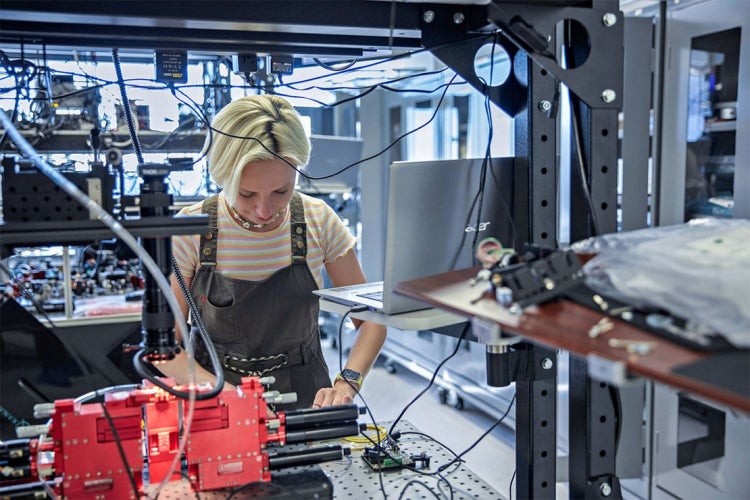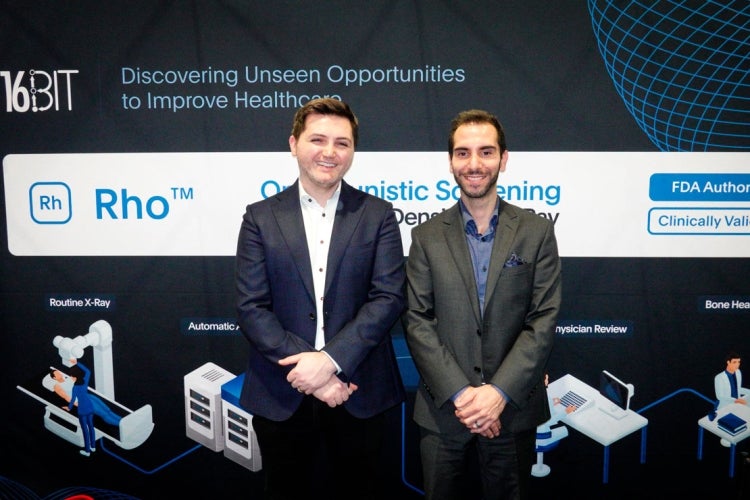U of T Entrepreneurship Week: 10 startups to watch in 2025

Kiwi Charge, which is working to boost EV adoption by improving charging infrastructure, is one of several U of T startups that are making waves in vital industries (photo supplied by Kiwi Charge)
Published: February 26, 2025
A portable charger for electric vehicles. Using quantum chemistry and artificial intelligence to clean polluted water. A dental smart gum for oral health on the go.
These are just a handful of the innovative ideas that entrepreneurs who are connected with the University of Toronto are turning into potentially game-changing startup companies.
Ranked among the top five university business incubators in the world, U of T Entrepreneurship is set to celebrate these and other startups during its ninth annual Entrepreneurship Week from March 3 to 7. The celebration includes pitch competitions, startup showcases, inspirational talks and more.
Here are 10 exciting U of T-affiliated startups to keep an eye on in 2025:
Xatoms

Xatoms is using quantum chemistry and AI to accurately predict 3D models of photocatalytic molecules that can help clean polluted water. The startup sprang from a discovery that CEO Diana Virgovicova made at age 17, when she used quantum chemistry software to model a molecule that can eliminate pollutants from water in the presence of sunlight.
Virgovicova’s startup is already turning heads, making to the final six of the global Hult Prize and attracting the attention of American actor and co-founder of Water.org Matt Damon.
Waabi

Waabi is a self-driving trucking startup founded by Raquel Urtasun, a professor of computer science in the Faculty of Arts & Science, co-founder of the Vector Institute and a world-renowned expert in AI for autonomous transportation.
In June 2024, the company, which is headquartered in Toronto, announced that it raised US$200 million in series B funding. More recently, the startup inked a partnership with Volvo Autonomous Solutions to jointly develop and deploy autonomous trucks.
Watch Waabi on CBC’s The National
Kiwi Charge

Kiwi Charge has developed a portable electric vehicle (EV) charger that’s designed to bring the power outlet to the EV as opposed to the other way around – an offering designed for owners who live in high-rise buildings or dense urban neighbourhoods.
Founded by Abdel Ali, Kiwi Charge was part of the 2023 cohort of the Nobellum Innovator Program and the 2024 cohort of the Black Founders Network (BFN) Accelerate program. Down the road? The company is working on a self-navigating robot to locate and charge its customers’ rides.
Xanadu

A graduate of the Creative Destruction Lab seed-stage accelerator at the Rotman School of Management, Xanadu is working to create a commercially viable quantum computer that can operate at room temperature (many quantum computing chips need to be super-cooled to extreme temperatures) and uses easily obtained components.
In January, the company, founded by former U of T post-doctoral researcher Christian Weedbrook, announced the completion of Aurora, the world’s first prototype of a modular, scalable and networked quantum computer.
Cohere

Cohere provides advanced Large Language Models (LLM) and Natural Language Processing (NLP) to help businesses integrate AI into their applications. The startup was co-founded by Aidan Gomez and Nick Frosst – both of whom worked with U of T Nobel Prize-winner and “godfather of AI” Geoffrey Hinton – and former U of T computer science student Ivan Zhang.
In June, Cohere announced that it launched a startup program that will enable companies to leverage its AI models at discounted rates to support early-stage AI innovation. And, in December, the company announced the release of a new LLM designed for enterprise users.
Cohere has raised over US$900 million from investors and was last valued at US$5.5 billion, according to Reuters.
Toothpod

Toothpod, an oral care startup, has developed a “dental smart” gum for oral health on the go – using anti-microbial, anti-inflammatory and remineralizing agents to clean the teeth, mouth and tongue when a toothbrush is unavailable.
Co-founded by U of T alumna Vishar Yaghoubian and PhD candidate Brian Webb in 2022, Toothpod aims to make oral hygiene more convenient and accessible, whether at work, on an airplane or while camping.
The startup won the Pitch with a Twist competition at last year’s Entrepreneurship Week and placed third in the Health Innovation Hub (H2i) FemSTEM competition and the early-stage category of the Desjardins Startup Prize. Its product has already been launched in hundreds of dental clinics.
HDAX Therapeutics

HDAX Therapeutics is a drug company that develops targeted treatments for peripheral nerve damage, which can result from chemotherapy or radiation, or cardiometabolic diseases like heart disease, diabetes and stroke. In particular, the startup focuses on HDAC 6 – a protein that has been linked to cardiovascular diseases and neurodegenerative disorders – in their treatments.
The startup was co-founded in 2021 by U of T alumni Pimyupa Manaswiyoungkul and Nabanita Nawar, who met in the lab and grew the technology out of U of T Mississauga’s department of chemical and physical sciences. They hope to see HDAX Therapeutics lead in targeted treatments for diseases with high unmet needs in the future.
MedEssist

MedEssist develops patient management software designed to help pharmacies improve patient care, deliver better care to underserved communities and streamline operations. The software is used by more than 500 independent pharmacies, especially during vaccine seasons.
Co-founded by U of T alumni Joella Almeida and Michael Do in 2018, the health-tech startup has raised US$2.86 million from investors, according to Pitchbook, and is partnering with Uber Direct to provide same-day medication delivery access to pharmacies across North America.
16 Bit

16 Bit develops medical device software that improve the efficiency and quality of health care. Its flagship product, Rho, is a screening device that detects low bone density through X-ray imaging obtained for other medical purposes in patients 50 and older. The company has already received authorization from the U.S. Food and Drug Administration to begin marketing Rho in the United States.
Co-founded by co-CEO Mark Cicero,16 Bit began its journey with the Health Innovation Hub (H2i) accelerator in the Temerty Faculty of Medicine and the Creative Destruction Lab at the Rotman School of Management.
MOTUS

Startup co-founders and siblings Sydnie and Malik Pottinger became the first students to partner with U of T’s Trademark and Licensing Office with their clothing brand MOTUS.
The siblings, who launched their company in 2023, took on everything from designing clothing and creating a logo to arranging manufacturing and shipping orders. The startup also received support from U of T’s Spaces and Experiences team and the Black Founders Network (BFN).
MOTUS was one of 11 startups chosen to participate in the BFN Accelerate program in 2024, an incubator for early-stage Black-led startups.



